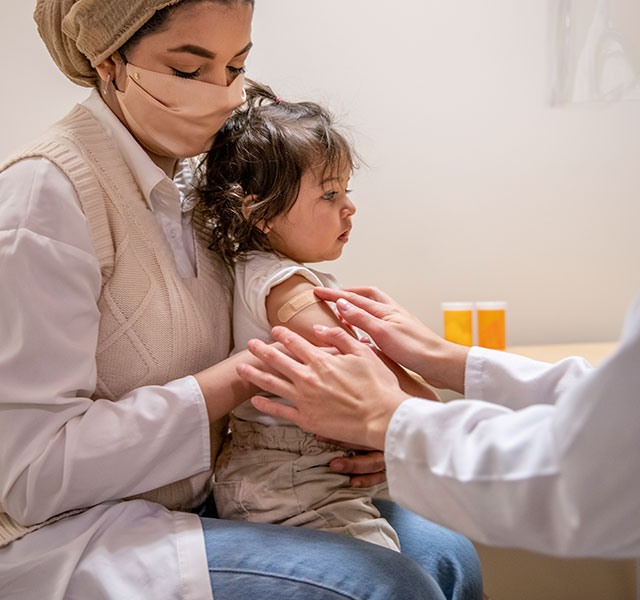At long last, children ages 6 months through 4 years old can now get vaccinated against COVID-19. Late last month, the Food & Drug Administration (FDA) issued an emergency use authorization for both the Pfizer and Moderna vaccines. Soon after, the Centers for Disease Control and Prevention (CDC) reviewed the data and endorsed both vaccines for this age group.
The Pfizer vaccine was approved for children ages 6 months to 4 years old, while the Moderna vaccine was approved for children ages 6 months to 5 years old. (The Pfizer vaccine was previously approved for age 5.) While both the Pfizer and Moderna vaccines are safe and effective, they are taken in different doses:
- The Pfizer vaccine is given to children ages 6 months to 4 years old in three doses. The first two doses are given three to eight weeks apart. The second and third doses are given at least eight weeks apart. Each dose of Pfizer is one tenth of the adult dose.
- The Moderna vaccine is given to children ages 6 months to 5 years old in two doses, spaced four to eight weeks apart. Each dose of Moderna is one fourth of the adult dose.
For both vaccines, children are considered fully protected two weeks after their final dose. Here, Jordan Kridler, M.D., a pediatrician at Henry Ford Health, answers questions parents might have before getting their child vaccinated.
1. What are the most common vaccine side effects in ages 6 months to 5 years old?
“Side effects aren’t too different from side effects in adults. Fever, irritability, drowsiness and decreased appetite are commonly reported side effects in young children,” says Dr. Kridler. “They may also experience injection-site pain, swelling and redness or nausea, but as with adults, side effects are mild and should go away within two days of the onset of symptoms.”
Since the Moderna vaccine is a higher dose than Pfizer, side effects like fever may be more common with Moderna. But neither vaccine caused more side effects in children than in adults.
2. How effective are the vaccines for ages 6 months to 5 years old?
According to evidence examined by the FDA, Moderna clinical trials showed that in children ages 6 months through 23 months, the vaccine was 50.6% effective against symptomatic infection. In children ages 2 through 5, the Moderna vaccine was 36.8% effective against symptomatic infection. “Although these percentages may seem low, we know that the vaccine is highly effective in reducing the severity of disease and need for hospitalization for these younger children,” says Dr. Kridler.
The effectiveness of the Pfizer vaccine was determined by comparing immune responses in children ages 6 months to 4 years old with the immune response of teenagers and young adults ages 16 to 25. According to evidence examined by the FDA, a preliminary Pfizer clinical trial showed the effectiveness in children 6 months through 4 years of age is similar to the 16 – 25 age group, or about 80.3% effective in preventing symptomatic infection. (Parts of this study, however, were conducted before the Omicron variant was the dominant strain in the U.S.)
3. How should I choose which vaccine to give my child?
“The bottom line is that both vaccines are safe and effective,” says Dr. Kridler. “Either one would be a good choice. The decision comes down to preference: If you don’t want your child to get poked three times, or if you’re on a time crunch and headed out of town, I would say get Moderna because your child will be fully vaccinated faster.
“If you aren’t on a time crunch, or if you want to lessen the likelihood of side effects, I might be more inclined to recommend Pfizer. Since it has a lower dosage, it may lead to lessened side effects. If you still aren’t sure, talk to your pediatrician.”
4. If my child had COVID-19, do they need to get vaccinated?
To state it simply, yes. “Right now, we don’t know exactly how long immunity lasts after getting COVID-19, especially in younger kids,” says Dr. Kridler. “Even if your child has had COVID-19 and does have some immunity, getting vaccinated will give them an extra level of protection, especially as they head off to summer camp and then as they go to school in the fall.”
5. Can my child get the COVID-19 vaccine with other routine vaccinations?
“Yes, it is safe to do so,” says Dr. Kridler. “Here at Henry Ford Health, most providers will allow up to four vaccines at a time. If parents would rather have a separate appointment for the COVID-19 vaccine, they can also do that.”
6. During Pfizer’s first clinical trial for the 6-month to 4-year-old age group, the vaccine was safe but didn’t offer protection. Why?
“I think part of the reason is that they were giving children small doses to try to minimize any side effects, and that is why the approval was halted for a period of time,” says Dr. Kridler. “They wanted to get more data on what a third dose could do.”
7. If my child is immunocompromised, should they get vaccinated?
“If your child has a weakened immune system or an underlying health issue, that’s all the more reason to get them vaccinated,” says Dr. Kridler. “I strongly recommend that children with weakened immune systems or underlying health issues get vaccinated.”
The vaccination guidelines are a bit different for young children who are immunocompromised:
- Pfizer: For children ages 6 months to 4 years old who are moderately or severely immunocompromised, the first and second doses are separated by three weeks, and the second and third doses are separated by at least eight weeks.
- Moderna: Children ages 6 months to 5 years old who are moderately or severely immunocompromised should receive a third dose, with the first and second doses separated by four weeks and the second and third doses separated by at least four weeks.
8. How do we know the COVID-19 vaccines won’t cause long-term effects in small children?
“When parents ask me this, I try to be very straight forward with them,” says Dr. Kridler. “Yes, these are newer vaccines and no, we don’t have 10 or 15 years of data, but we have so much more resources and information than we did, for example, when we made the MMR vaccine, or the hepatitis B vaccine, or the polio vaccine, and those vaccines were safe and did such a great job at eradicating those illnesses.”
The COVID-19 vaccines have also been given to hundreds of millions of people for more than a year and a half, so we know they’re extremely safe. And while the COVID-19 vaccines may be newer, mRNA technology is not—we know that it doesn’t alter your DNA or lead to long-term side effects.
“And even though children are less likely than adults to contract a serious case of COVID-19, it can happen,” Dr. Kridler adds. “The risks of vaccine complications are much smaller than the potential risk of getting a serious case of COVID-19. I truly believe in the FDA and CDC’s approval. I don’t think they would have approved something for little kids that they didn’t feel had enough research and data to back it up.”
Parents can schedule COVID-19 vaccine appointments for their children ages 6 months and up via MyChart or by calling their Henry Ford Health physician’s office. Henry Ford Health only offers the Pfizer vaccine. Read our FAQs about kids and the COVID-19 vaccines for more information about vaccines and boosters for children.
Dr. Jordan Kridler is a board-certified pediatrician who sees patients at Henry Ford Medical Center – Royal Oak.



